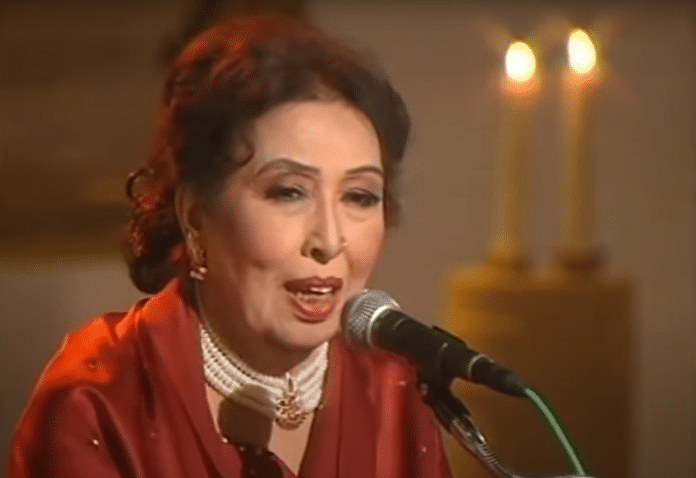On 13 February, 1986, when Iqbal Bano appeared in front of a 50,000-strong crowd and sang Faiz Ahmed Faiz’s iconic poem, Wa yabqa wajh-o-rabbik, more popularly known as Hum Dekhenge, she probably had not imagined that her act of defiance would have a ripple effect decades later in India. Not only did she sing the poem in protest against Zia-ul-Haq, but did so clad in a black sari — black, the colour of protest; sari, the attire Pakistan’s then President had banned.
But the Pakistani singer, who was born and raised in Delhi, is much more than that one event. The ghazal queen, equally comfortable singing the traditional and modern forms, lent her voice to All India Radio (AIR) and later, after Partition, to a number of Pakistani films, and was even given the Pride of Pakistan award from the government in 1974.
On her 11th death anniversary, ThePrint looks at the legacy of Iqbal Bano and Hum Dekhenge.
Also read: What Coke Studio did to Faiz’s song, Pakistan is doing to its people
Voice of two countries
Born in 1937, Iqbal Bano spent her childhood learning music from Ustad Chaand Khan in Delhi. By her teens, she had started singing solo songs set to classical ragas and even recorded it for AIR. Ustad Chaand Khan taught her both pure and light classical music.
Her father had recognised early on that Bano developed a refined taste in music and said, “My daughters do sing reasonably well, but Iqbal Bano is especially blessed in singing. She will become a big name if you begin her training.”
Five years after Partition, she married into a land-owning family in Multan, which was by then in Pakistan, and migrated. In Multan, she slowly found a place for herself in the Pakistani film industry. Apart from ghazals, she also created a niche for herself in Urdu films such as Gumnaam (1954), Qatil (1955), Inteqaam (1955), Sarfarosh (1956), Ishq-e-Laila (1957) and Nagin (1959). But she was equally well known for her classical performances, beautifully presenting thumris in ragas such as Khammach, Tilak Kamod, Des, Pilu and many others.
Through the course of her musical career, Iqbal Bano straddled the worlds of traditional and modern ghazals, traditionally written in appreciation of the almighty or in lamentation of the beloved. But she made headlines for her renditions of Pakistani Marxist Faiz Ahmed Faiz’s poetry, especially Hum Dekhenge. Faiz might have written the words but it was Iqbal Bano who made them the potent symbol of protest they are to date.
Also read: Prankster and Pakistani patriot: Aatish Taseer’s dad Salmaan was a man of many selves
Hum Dekhenge
Faiz wrote this poem in 1979, two years after a military coup in Pakistan by General Zia-ul-Haq. Under this regime, Pakistan’s democracy was flailing and he submitted it to an Islamic state laden with religious symbolism. The poem called out Zia, who was a worshipper of power and not of Allah. Iqbal Bano’s iconic performance in 1986 came at a time when Pakistan and its people had been forced into submission by Zia’s military regime.
Faiz’s grandson, Ali Madeeh Hashmi, was also present at her performance. He recalled that before she even came on stage, the hall was “filled to the brim”. Hashmi wrote, “Once the doors were opened, people streamed in and soon there was not an inch of space left in the hall. People were sitting on the stairs, the floors, wherever they could find some space. Iqbal Bano appeared and started singing to loud cheers. She sang many Faiz poems but the loudest cheers were reserved for Hum Dekhenge. She finished the concert, but the audience refused to let her leave and begged for an encore of Hum Dekhenge. A technician in Alhamra surreptitiously recorded the encore and this is the recording that survives today. For those of us sitting in the hall, it was quite surreal. The clapping and cheers were so thunderous that it felt at times that the roof of Alhamra hall would blow off.”
Hashmi also recalled that Bano had to repeatedly pause singing to give way to chants of ‘Inquilab Zindabad’ from the audience.
What was more striking about Bano’s performance was its aftermath. Hashmi wrote, “It goes without saying that such gatherings was strictly proscribed during the Zia military dictatorship. The same night, authorities raided the homes of the organisers and many of the participants looking for any audio copies of the concert, especially Hum Dekhenge.”
Fortunately, one of Hashmi’s uncles got his hands on a copy which was then copied and distributed widely. Iqbal Bano was also banned from singing on television or in public. However, these restrictions only made her more famous, and she continued to perform for select private gatherings, where, it is rumoured, her guests even included military officials.
Also read: Sorry Shoaib Akhtar, India can’t raise funds with Pakistan for Covid-19. You are the ‘enemy’




Faiz wrote the poem in 1979 as a warning to non believers
It’s funny how Sanghi bigots like you who vote for terrorists and mass murderers of your own religion have the audacity to call all Muslims as Jihadis.